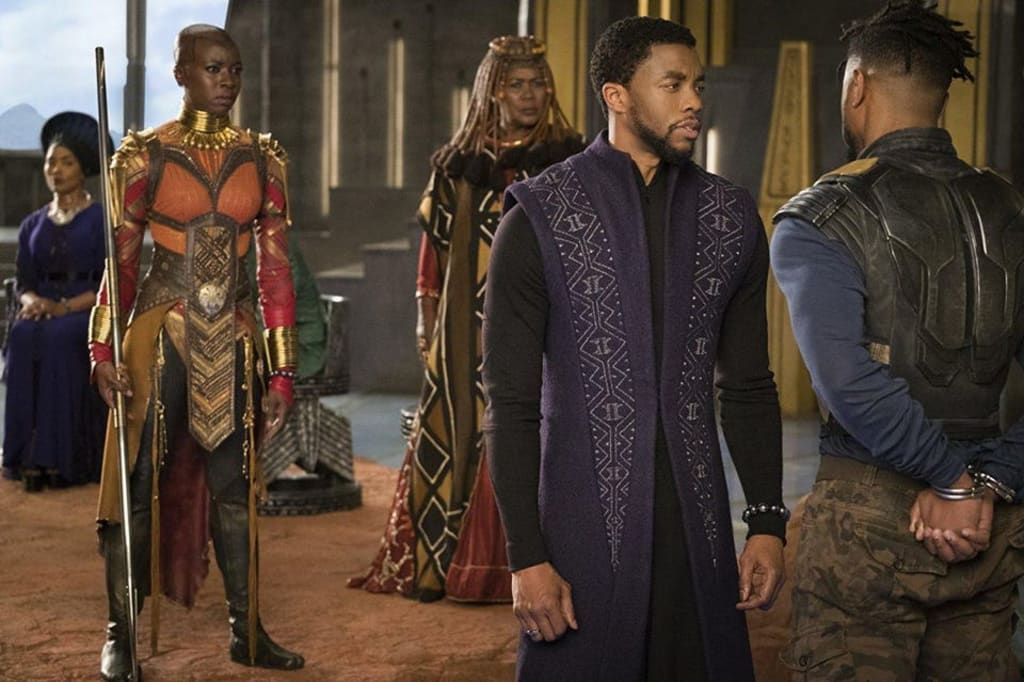Black Panther (2018) Part 2
A movie review

The way the film avoids traditional either/or boundaries, particularly the binary opposition that tends to dominate our debate on race, is part of the movie's pleasure and ethos — which wends through its images. Wakanda's life is urban and rural, futuristic and traditional, technological and mystical all at the same time. A hover train zips over a market with hanging woven baskets while spaceships whiz over soaring houses with thatched roofs. An open-air throne room is horizontally draped with hung tree limbs in one of the most stunning locations, creating a loose pattern that deliberately blurs the barrier between the inner and external worlds and is repeated by fretwork in garments and other sets.
Killmonger, whose emotional, tumultuous backstory lends the film more gravitas and real-world tension than any of Marvel's other superhero blockbusters, exemplifies the rejection of the either/or dichotomy. "Black Panther" follows a familiar father-and-son drama — there's an assassination, a power vacuum, and a reluctant heir — a patrilineal intrigue that's filled in here with intense face-offs involving questions of ancestry, identity, the African diaspora, the new world, and the old — a patrilineal intrigue that's filled in with intense face-offs involving questions of ancestry, identity Sterling K. Brown, a trembling, vibrantly sensitive actor who portrays entire chapters of pain, is featured in one particularly poignant narrative thread. (He has Juliette Binoche beat when it comes to tears.)
Killmonger's emotional, tortured backstory offers the film more gravity and real-world tension than any of Marvel's other superhero blockbusters. "Black Panther" follows a familiar father-and-son drama — there's an assassination, a power vacuum, and a reluctant heir — a patrilineal intrigue that's filled in here with intense face-offs involving questions of ancestry, identity, the African diaspora, the new world, and the old — a patrilineal intrigue that's filled in here with intense face-offs involving questions of ancestry, Sterling K. Brown, a tremulous, vibrantly sensitive actor who portrays entire chapters of loss, is featured in one particularly affecting narrative thread. (He has the ability to out-weep Juliette Binoche.)
He is flanked by a phalanx of women, including a battalion of female fighters known as the Dora Milaje, which is crucial to the film's politics and myth-building. These aren't the annoyingly token strong women of Hollywood, the tough beauties with large biceps and skills who have no genuine roles. T'Challa is surrounded by women who provide maternal, military, sisterly, and scientific support to him, despite his father troubles. His young sister (a lively Letitia Wright) delivers gadgets and caustic asides á la Bond's gadget guy; a female general (Danai Gurira) stands at his side. As the royal mother, Angela Bassett shines, while Lupita Nyong'o, as a spy, makes a compelling argument for her own spinoff.
Wakanda is eventually the movie's power, its rallying cry and state of mind, bolstered by its groovy women and Afrofuturist embellishments. "A third-world country – textiles, shepherds, smart clothing," a white character casually characterises it early on. Wakanda fits that profile, only its shepherds monitor the border with techno-wizardry, and its textiles and clothes shine because of the country's secret vibranium sauce, which the movie wittily engages. More importantly, because it has never been conquered, Wakanda has escaped the tragedies of colonialism and postcolonialism that have befallen much of the rest of Africa.
In "Black Panther," race matters, and it matters a lot, not just in terms of Manichaean good guys and evil people, but also as a way to examine greater human concerns about the past, present, and power uses and abuses. Even though those ideas are interwoven with plenty of comic-book bluster, this alone makes it more intelligent about how the universe works than many mainstream films. Without masculine squabbles and computerised avatars, it wouldn't be a Marvel production. Despite this, the film becomes a symbol of a past that was ignored and a future that feels very present due to its focus on black creativity, creation, and liberty. And it does it in a wonderful way, opening up its world, as well as yours.
About the Creator
Animals everywher
I love animals






Comments
There are no comments for this story
Be the first to respond and start the conversation.